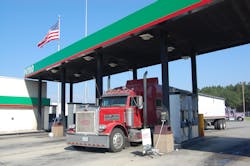Prices for both diesel and gasoline continued to dip across much of the U.S. this week, continuing a slide that’s shaved 1.1 cents and 8 cents per gallon off average retail pump prices for diesel and gasoline, respectively, over the past three weeks.
According to data tracked by the Energy Information Administration (EIA), for the week of June 24, U.S. average retail pump prices for diesel dropped 3/10ths of a penny to $3.838 per gallon, though that price is 16 cents per gallon higher compared to the same week in 2012.
Diesel prices increased in 6 regions across the nation while dropping in four: the Gulf Coast (1/10thof a penny per gallon), the Midwest (a 1.2 cent decline), the Central Atlantic (an 8/10ths of a penny drop), and the Rocky Mountains (1.2 cents). The Gulf Coast and Midwest are home to the lowest diesel prices in the U.S. at the moment, noted EIA in its weekly report, at $3.74 and $3.758 per gallon, respectively.
Average U.S. retail pump prices for gasoline experienced a steeper drop this week, falling 4.9 cents to $3.577 per gallon, EIA noted, though that price is still 14 cents per gallon higher compared to the same week in 2012.
Gasoline prices declined in all regions of the U.S. except three: the Central Atlantic, where prices jumped 1.4 cents per gallon, plus the West Coast (up 6 cents) and California. Currently the East Coast is home to the cheapest gasoline in the nation at $3.563 per gallon, the agency said.
EIA believes fuel prices should stick to a downward slope for the remainder this year but cautions that energy price forecasts are now “highly uncertain” due to significant shifts in global oil prices.
According to the agency’s recent short term energy outlook, after increasing to $119 per barrel in early February, the Brent crude oil spot price fell to a low of $97 per barrel in mid-April but then recovered to an average of $103 per barrel in May. EIA expects that the Brent crude oil spot price will average $102 per barrel over the second half of 2013, and $100 per barrel in 2014.
As a result, EIA expects the price of regular gasoline will average $3.53 per gallon over the summer driving season (April through September) with annual average regular gasoline retail prices projected to decline from $3.49 per gallon this year to $3.37 per gallon in 2014.
Yet oil consumption rates by nations outside the traditional Organization for Economic Cooperation and Development or OECD bloc – a bloc that includes the U.S., Europe, and Japan – is rapidly rising, leading EIA to warn that current values of futures and options contracts suggest that oil prices could differ significantly from projected levels.
For example, in April, estimated total liquid fuels consumption in non-OECD countries reached 44.5 million barrels per day (bbl/d) – exceeding consumption in OECD countries (44.3 million bbl/d) for the first time in history. Still, for the year, EIA expects that oil consumption in OECD countries will be higher, averaging 45.5 million bbl/d compared to 44.6 million bbl/d for non-OECD nations.
About the Author
Sean Kilcarr
Editor in Chief
Sean Kilcarr is a former longtime FleetOwner senior editor who wrote for the publication from 2000 to 2018. He served as editor-in-chief from 2017 to 2018.
